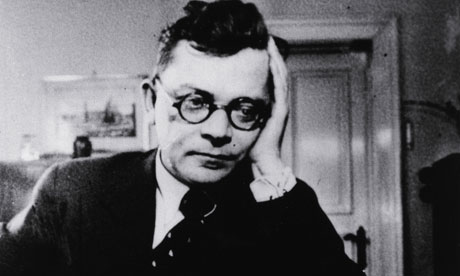
First English translation of novel about Gestapo hunt for German couple who defied Hitler enjoys record sales
- The Observer, Sunday 23 May 2010

Hans Fallada's 1947 novel Alone in Berlin has sold 100,000 in three months in the UK.
A little-known thriller about the German resistance against the Nazis has become the sleeper hit of the summer – more than 60 years after it was written.
Now it has finally been translated into English, Hans Fallada's Alone in Berlin is taking bestseller lists by storm on both sides of the Atlantic. In the UK alone, Penguin Classics has sold more than 100,000 copies in just three months and is expecting to exceed 250,000 sales within the year – astonishing figures considering that most English novels barely sell a few thousand copies.
It has reached the official UK Top 50 for all UK publishers, a rare achievement for a classic. In the US, Melville House Publishing, a small independent company from whom Penguin bought the rights, is also seeing vigorous sales.
Word-of-mouth recommendations, partly through book clubs, are resurrecting an author who had been practically unknown in the English-speaking world. That this translation has taken so long is particularly surprising as Primo Levi, the revered Jewish Italian writer who survived the Nazi concentration camps, once described it as "the greatest book ever written about the German resistance to the Nazis".
Written in 1947, the novel is a chilling portrayal of extreme fear under dictatorship. It is about an ordinary Berlin couple, Otto and Anna Quangel, who in a small way stage a protest against the Nazis after their only son is killed in action in 1940 by denouncing Hitler in postcards which they leave across the city. It is also an exciting thriller about the Gestapo detective pursuing them.
The story is inspired by the real-life heroics of a working-class couple, Otto and Elise Hampel, who were eventually caught and beheaded in 1943.
Fallada died of a morphine overdose aged 53, shortly before Alone in Berlin was published. It was a tragic end to a tragic life. The son of a judge, he was plagued by mental illness, drugs and alcohol, spending years in psychiatric hospitals and prisons, and was denounced as an anti-Nazi conspirator.
Born Rudolf Ditzen, he adopted Hans Fallada as his pen name from a Brothers Grimm tale, and became a prominent writer in the 1930s. His 1932 novel, Little Man, What Now?, was a hit in Germany, and single-handedly rescued the fortunes of his small publisher.
Yesterday, his 80-year-old son, Ulrich Ditzen, a retired lawyer, told the Observer he was overwhelmed by the latest sales: "It's a phenomenon."
Dennis Loy Johnson, who founded Melville House Publishing nine years ago, said he was shocked when he discovered that Alone in Berlin had not been translated. "The minute I'd read it, I wanted to put it out," he said.
Adam Freudenheim, publisher of Penguin Classics, said: "It is a book that you can't help but talk about and remember. It asks, 'What would you have done if you'd been there?'."
It remains to be seen whether Fallada inspires interest in other foreign titles from UK publishers. Translated fiction accounts for barely 1% of their sales. Valerie Henitiuk of the British centre for literary translation at the University of East Anglia, said there was a belief among UK publishers that the public will shy away from translations. "In fact, readers just want to read good books. They don't care if they're written in another language," she said.
The signs are promising. Wolf Among Wolves, Fallada's 1937 novel about the 1920s slump, went on sale last week in Britain through Melville House. It has already gone into its third printing. Fallada's son considers it is his father's "greatest and best book". Fallada himself once told his mother that Alone in Berlin was a "truly great novel… somewhat along the lines of my Wolf ".
The film rights to Alone in Berlin have been acquired by Vincent Perez, the actor-director, and Stefan Arndt, who produced the acclaimed Good Bye, Lenin! Perez told the Observer that, as the son of a German mother, he was shocked by Alone in Berlin. "I felt how it was to be living in Germany under the Third Reich. I understood how it was to deal with that pressure around you… The book revealed something new."
By chance, he has just discovered – from television researchers preparing a programme on him – that his own German family had resisted the Nazis and that his uncle had been gassed by them.



Πραγματικά, πρόκειται για ένα μοναδικό βιβλίο και μιά ιδιαίτερη εμπειρία. Το διάβασα το περασμένο καλοκαίρι, και πάνω απ'όλα μου έκανε εντύπωση η απλή και μεθοδική δυνατότητα εξέγερσης του απλού πολίτη, εκείνου που λιγότερο απ'όλους φαντάζεσαι ότι θα αντισταθεί σε μία αμοραλιστική και φονική εξουσία. Κι όμως γίνεται, κι όμως σε πείθει, κι όμως σου δίνει κουράγιο, και στο μυαλό σου έρχεται εκείνο το "Δεν αρμόζει υποταγή σε ανέντιμη εξουσία, παρά αντίσταση κι εξέγερση".
ΑπάντησηΔιαγραφή